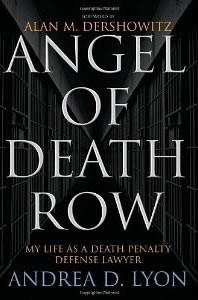Book Notes
 Andrea D. Lyon, Angel of Death Row; My Life as a Death Penalty Defense Lawyer (New York: Kaplan, 2010), 267pp.
Andrea D. Lyon, Angel of Death Row; My Life as a Death Penalty Defense Lawyer (New York: Kaplan, 2010), 267pp.
Back in 1995 a feature article in the Chicago Tribune dubbed Andrea Lyon as the "angel of death row" for her fourteen years of service in the Cook County Public Defender's Office, where she eventually became Chief of the Homicide Task Force. She describes herself differently, though: "I see myself as a sometimes cranky warrior standing at the intersection of life and death. My foe is a criminal justice system that, despite common belief, gives enormous advantages to the prosecution and stacks the cards according to wealth, race, and social custom." She's an unapologetic "defender of accused killers" (135) and "an archaeologist of social despair, unearthing, layer by layer, my clients' descent into criminal jeopardy" (145).
Lyon has argued more than 130 homicide cases. In nineteen cases she defended clients who were found guilty of capital murder, arguing that they be spared the death penalty in favor of a lesser punishment. She won all nineteen cases. Chapter by chapter she introduces us to people that society loves to hate and stereotype, like Lonnie Fields, who murdered a judge and an attorney in a courtroom before twenty-seven witnesses; Lincoln Freeman, whose murder conviction was overturned; a male prostitute named Russell Leland; and Annette Grimes, a mother wrongly accused of killing her own baby. Lyon defends these people with tenacity and passion.
Lyon never romanticizes her clients, excuses their crimes, fudges the truth, or idealizes her work. But as a committed champion of the underdog-outsider, she believes that "every person amounts to more than the worst thing he or she has ever done" (20). No one is ever beyond redemption or reconciliation. She's also committed to fight the system that often elevates politics and procedure over questions of guilt, innocence, and fairness. Lyon grew up as a secular Jew, but her powerful story-telling made me wonder if she has ever connected her compelling call to defend the poor with her Hebrew heritage in Proverbs 31:8: "Speak up for those who cannot speak for themselves, for the rights of all who are destitute."


